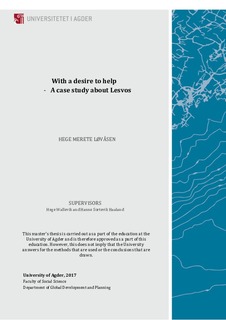| dc.contributor.author | Løvåsen, Hege Merete | |
| dc.date.accessioned | 2018-04-09T10:11:53Z | |
| dc.date.available | 2018-04-09T10:11:53Z | |
| dc.date.issued | 2017 | |
| dc.identifier.uri | http://hdl.handle.net/11250/2493192 | |
| dc.description | Master's thesis Global development and planning UT505 - University of Agder 2017 | nb_NO |
| dc.description.abstract | In 2015 an unexpected flow of refugees and migrants headed into southern Europe. This was the start of one of the biggest humanitarian crisis in recent history affecting Europe. Over two and a half years later, the crisis is still ongoing. Most refugees and migrants have arrived in Italy and Greece, which have put an enormous pressure on these countries. Some arrival spots are more popular than others and have created so-called ‘hot spots.’ One of them is the Greek island of Lesvos. This research has explored how different actors have met and engaged in this humanitarian crisis on Lesvos. This is a qualitative research conducted as a case study. The focus is on one refugee camp in particular, a site called Kara Tepe. Kara Tepe is a camp for vulnerable refugees and is run by the local authorities. In addition, I have also looked into some of the different citizen initiatives that have been created all over Lesvos as a response to the crisis. This thesis focuses on how the official versus the informal initiatives and the professional versus the unskilled volunteers are working side by side. It explores the cooperation between the different actors and how the situation has evolved during the year of 2017. When this research ended, there were still no signs suggesting that the crisis would come to an end, rather the opposite. Numbers are rising and the different actors on Lesvos are afraid the island and the refugees and migrants that are stuck here will experience yet another catastrophic winter. As discussed in this thesis, it might be time to realize that the situation is going from a temporary to a more permanent one, thus considering more sustainable and permanent solutions. In addition, the commitment and involvement of the unskilled and private citizen initiatives has proven to become an important, and not least increasing part of aid work, thus they need to be recognized and included as actors. | nb_NO |
| dc.language.iso | eng | nb_NO |
| dc.publisher | Universitetet i Agder ; University of Agder | nb_NO |
| dc.rights | Attribution-NonCommercial-NoDerivatives 4.0 Internasjonal | * |
| dc.rights.uri | http://creativecommons.org/licenses/by-nc-nd/4.0/deed.no | * |
| dc.subject | UT505 | nb_NO |
| dc.title | With a desire to help : A case study about Lesvos | nb_NO |
| dc.type | Master thesis | nb_NO |
| dc.subject.nsi | VDP::Samfunnsvitenskap: 200::Samfunnsgeografi: 290 | nb_NO |
| dc.source.pagenumber | 104 p. | nb_NO |

